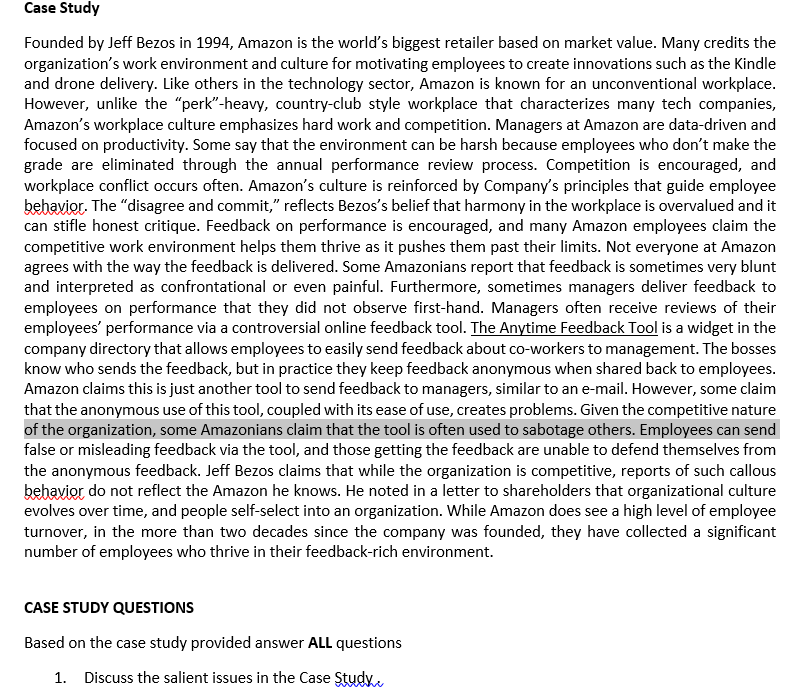ganization's work environment and culture for motivating employees to create innovations such as the Kir nd drone delivery. Like others in the technology sector, Amazon is known for an unconventional workpl owever, unlike the "perk"-heavy, country-club style workplace that characterizes many tech compar mazon's workplace culture emphasizes hard work and competition. Managers at Amazon are data-driven cused on productivity. Some say that the environment can be harsh because employees who don't make ade are eliminated through the annual performance review process. Competition is encouraged, orkplace conflict occurs often. Amazon's culture is reinforced by Company's principles that guide emplo ehavior. The "disagree and commit," reflects Bezos's belief that harmony in the workplace is overvalued ar an stifle honest critique. Feedback on performance is encouraged, and many Amazon employees claim ompetitive work environment helps them thrive as it pushes them past their limits. Not everyone at Ama grees with the way the feedback is delivered. Some Amazonians report that feedback is sometimes very b
ganization's work environment and culture for motivating employees to create innovations such as the Kir nd drone delivery. Like others in the technology sector, Amazon is known for an unconventional workpl owever, unlike the "perk"-heavy, country-club style workplace that characterizes many tech compar mazon's workplace culture emphasizes hard work and competition. Managers at Amazon are data-driven cused on productivity. Some say that the environment can be harsh because employees who don't make ade are eliminated through the annual performance review process. Competition is encouraged, orkplace conflict occurs often. Amazon's culture is reinforced by Company's principles that guide emplo ehavior. The "disagree and commit," reflects Bezos's belief that harmony in the workplace is overvalued ar an stifle honest critique. Feedback on performance is encouraged, and many Amazon employees claim ompetitive work environment helps them thrive as it pushes them past their limits. Not everyone at Ama grees with the way the feedback is delivered. Some Amazonians report that feedback is sometimes very b
Management, Loose-Leaf Version
13th Edition
ISBN:9781305969308
Author:Richard L. Daft
Publisher:Richard L. Daft
Chapter12: Managing Human Talent
Section: Chapter Questions
Problem 2CFCA
Related questions
Question

Transcribed Image Text:Case Study
Founded by Jeff Bezos in 1994, Amazon is the world's biggest retailer based on market value. Many credits the
organization's work environment and culture for motivating employees to create innovations such as the Kindle
and drone delivery. Like others in the technology sector, Amazon is known for an unconventional workplace.
However, unlike the "perk"-heavy, country-club style workplace that characterizes many tech companies,
Amazon's workplace culture emphasizes hard work and competition. Managers at Amazon are data-driven and
focused on productivity. Some say that the environment can be harsh because employees who don't make the
grade are eliminated through the annual performance review process. Competition is encouraged, and
workplace conflict occurs often. Amazon's culture is reinforced by Company's principles that guide employee
behavier. The "disagree and commit," reflects Bezos's belief that harmony in the workplace is overvalued and it
can stifle honest critique. Feedback on performance is encouraged, and many Amazon employees claim the
competitive work environment helps them thrive as it pushes them past their limits. Not everyone at Amazon
agrees with the way the feedback is delivered. Some Amazonians report that feedback is sometimes very blunt
and interpreted as confrontational or even painful. Furthermore, sometimes managers deliver feedback to
employees on performance that they did not observe first-hand. Managers often receive reviews of their
employees' performance via a controversial online feedback tool. The Anytime Feedback Tool is a widget in the
company directory that allows employees to easily send feedback about co-workers to management. The bosses
know who sends the feedback, but in practice they keep feedback anonymous when shared back to employees.
Amazon claims this is just another tool to send feedback to managers, similar to an e-mail. However, some claim
that the anonymous use of this tool, coupled with its ease of use, creates problems. Given the competitive nature
of the organization, some Amazonians claim that the tool is often used to sabotage others. Employees can send
false or misleading feedback via the tool, and those getting the feedback are unable to defend themselves from
the anonymous feedback. Jeff Bezos claims that while the organization is competitive, reports of such callous
behavier do not reflect the Amazon he knows. He noted in a letter to shareholders that organizational culture
evolves over time, and people self-select into an organization. While Amazon does see a high level of employee
turnover, in the more than two decades since the company was founded, they have collected a significant
number of employees who thrive in their feedback-rich environment.
CASE STUDY QUESTIONS
Based on the case study provided answer ALL questions
1. Discuss the salient issues in the Case Ştudy
Expert Solution
This question has been solved!
Explore an expertly crafted, step-by-step solution for a thorough understanding of key concepts.
This is a popular solution!
Trending now
This is a popular solution!
Step by step
Solved in 2 steps

Recommended textbooks for you

Management, Loose-Leaf Version
Management
ISBN:
9781305969308
Author:
Richard L. Daft
Publisher:
South-Western College Pub


Management, Loose-Leaf Version
Management
ISBN:
9781305969308
Author:
Richard L. Daft
Publisher:
South-Western College Pub
